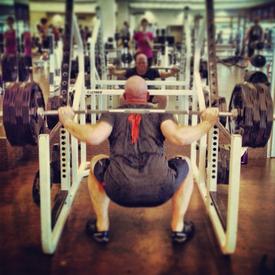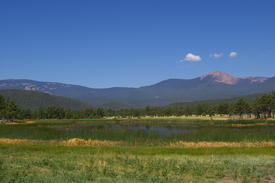If I am not building muscles, how am I getting stronger?

ruby_red_rose
Posts: 321 Member
Hello MFP,
I keep on hearing on these forums that it is impossible to build muscle while on a calorie deficit. I have lost 41lbs since July 2011, so, I must be on a calorie deficit. However, at the same time, I can lift more weight than I used to be able to at that time. For example, I lift 120 lbs now in the hip adduction/abduction machines (I started with 80 lbs). I can leg press 100 lbs now (I started with 75 lbs). How am I able to lift more if I have not built new muscle?
Thanks,
Rose
I keep on hearing on these forums that it is impossible to build muscle while on a calorie deficit. I have lost 41lbs since July 2011, so, I must be on a calorie deficit. However, at the same time, I can lift more weight than I used to be able to at that time. For example, I lift 120 lbs now in the hip adduction/abduction machines (I started with 80 lbs). I can leg press 100 lbs now (I started with 75 lbs). How am I able to lift more if I have not built new muscle?
Thanks,
Rose
0
Replies
-
Its possible to do both at the start of your training, but soon after you'll see diminishing returns.0
-
Through neurological adaptation. This is different and independant of muscle gain.0
-
You bring up a very valid question. I've thought about this quite a bit actually but haven't really looked into it. 4theking brings up a good starting point to start some google searches though.
I've been doing resistance training since October and while on a calorie deficit, I don't notice a whole lot of growth but rather a reduction in body fat and significant strength gains.0 -
Where did you hear that? You are definitely building muscle! Protein helps build muscle so keeping up your lean protein while decreasing your calories helps you build and maintain muscle. It is also important to have a little protein before and after your workout to help rebuild the muscle. Sounds like your doing the right thing!0
-
as mentioned by 4theking: "neurological adaptation." or muscle memory. also, muscle efficiency--am I correct on this?Where did you hear that? You are definitely building muscle! Protein helps build muscle so keeping up your lean protein while decreasing your calories helps you build and maintain muscle. It is also important to have a little protein before and after your workout to help rebuild the muscle. Sounds like your doing the right thing!0 -
Through neurological adaptation. This is different and independant of muscle gain.
Bingo.
In addition, it's not really true that you CAN'T build any muscle mass in a calorie deficit. If you have moderate to high BF%, it's tough ,inefficient, but possible.. As you get closer to ideal BF, it's pretty damn hard and you have to decide between bulking and cutting. At some point you just can't keep the body from feeding on protein.
Keep in mind that a body builder in a calorie surplus can gain -up to- an ounce of lean muscle in a day. Mortals like us will be less. (perceived muscle gain is water retention usually.)
i've been weight lifting progressive weights for about 4 months now in a deficit. I'm quite a bit stronger, and there are areas that have definite muscle growth. I haven't gained a lot - but it's obvious in areas like my lower abdomen, triceps, pecs, quads and calves.0 -
Hello MFP,
I keep on hearing on these forums that it is impossible to build muscle while on a calorie deficit. I have lost 41lbs since July 2011, so, I must be on a calorie deficit. However, at the same time, I can lift more weight than I used to be able to at that time. For example, I lift 120 lbs now in the hip adduction/abduction machines (I started with 80 lbs). I can leg press 100 lbs now (I started with 75 lbs). How am I able to lift more if I have not built new muscle?
Thanks,
Rose
By any chance, have you been tracking your body fat percentage? Scale weight is broken down into two categories: Pounds of fat and pounds of lean body mass. Scale weight loss and fat loss aren't the same thing.
Formula:
Weight x Body fat percentage = Pounds of fat
Weight - Pounds of fat = Pounds of lean body mass
Our pounds of lean body mass is the requirement for our bodies. We want to maintain or increase that number. Our pounds of fat is not the amount of pounds of fat or scale weight we need to lose.
Muscle is part of the lean body mass.
To my knowledge, when a person gain muscle, they will gain scale weight as well. If a person loses weight and gain lean body mass it's not because they have gained muscle, it's because they have gain lean body mass. It's the reason they are starting to look leaner.
When a person's muscles are stronger, they will feel stronger. You have said that you use to leg press 75 pounds, but now you are leg pressing 100 pounds. Gaining strength makes a person strong.0 -
You can build muscle on a deficit.. not sure who told you otherwise. It's especially possible if you already have excess fat on your body and you consume good amounts of protein in your diet. Your body will burn the fat for energy and use the protein to rebuild your muscle fibers.
Also should be noted that since you've lost body weight, it makes sense that you'd then be able to lift more weight in the gym, because you're no longer having to lift as much fat on your body, your muscles can work more efficiently to lift higher amounts of external weight (iron plates etc.).
Also, just because you are stronger, doesn't necessarily mean you have built new muscle. You may have actually trained your existing muscle fibers to work more effectively without increasing in size.0 -
I think it's bullsh|t that you can't build muscle on a calorie deficit. Obviously, you can't BULK UP, but you will build some muscle. If you're getting stronger, obviously something muslce-related is growing. That's my opinion, anyway!0
-
I'm going to vote for the neurological adaptation. Each time you perform a task the more efficient your body becomes at the task.
link below is to a detailed article on the subject
http://www.abcbodybuilding.com/neuraladaptations.pdf0 -
Neural adaptation can account for significant increases in muscle strength, with little or no increase in muscle size. The fact that one can lift more weight is not necessarily a sign of increase muscle size or mass. It takes a lot of work to "build muscle".0
-
Neural adaptation can account for significant increases in muscle strength, with little or no increase in muscle size. The fact that one can lift more weight is not necessarily a sign of increase muscle size or mass. It takes a lot of work to "build muscle".
to put this in perspective - squat down and pick something off the ground.... now stand up. Do you weigh more than 75 or 100 lbs? Not exactly the same as a leg press, but it shows how the body/mind works in different environments0 -
I'm breaking out my recent anatomy class knowledge here. At least its useful somewhere.
 . Basically, for about the first six weeks you start lifting, the increase in strength is actually your body learning how to better recruit your muscle fibers to contract. You become better controlled with the movement and your muscles more efficient at doing it. That's why people who have worked out before have "muscle memory." This might account for some of the strength gain you see. As for building it on a calorie deficit, I would say unlikely since your body is using all those calories to just keep you alive and isn't going to bother wasting them on building muscle. 0
. Basically, for about the first six weeks you start lifting, the increase in strength is actually your body learning how to better recruit your muscle fibers to contract. You become better controlled with the movement and your muscles more efficient at doing it. That's why people who have worked out before have "muscle memory." This might account for some of the strength gain you see. As for building it on a calorie deficit, I would say unlikely since your body is using all those calories to just keep you alive and isn't going to bother wasting them on building muscle. 0 -
What do you mean by that exactly?Neural adaptation can account for significant increases in muscle strength, with little or no increase in muscle size. The fact that one can lift more weight is not necessarily a sign of increase muscle size or mass. It takes a lot of work to "build muscle".
to put this in perspective - squat down and pick something off the ground.... now stand up. Do you weigh more than 75 or 100 lbs? Not exactly the same as a leg press, but it shows how the body/mind works in different environments0 -
I don't know enough of the technical aspects of this but I can add what confuses me a bit with the topic:
I had major knee surgery and during that one of the procedures they did shortened and removed muscle and ligaments. This was years ago but since I was in recovery I wasn't really able to rebuild that area and ended up with a mostly atrophied vastus medialus . Even though I've been on a reduced calorie diet for the last 6 month's I've been able to watch the space that was once depressed from lack of muscle fill back in with muscle, so how is this possible if you can't build muscle while on a calorie restricted diet?0 -
Well, I'm one of the guys that says you definitely can build muscle with a deficit.. but especially in your case, because the muscle had atrophied beyond its normal state. Your fibers do have a form of "muscle memory", so they can rebuild quickly once you start walking and putting those fibers to work again. It is much more difficult to build the muscle past that natural state.. especially for women.I don't know enough of the technical aspects of this but I can add what confuses me a bit with the topic:
I had major knee surgery and during that one of the procedures they did shortened and removed muscle and ligaments. This was years ago but since I was in recovery I wasn't really able to rebuild that area and ended up with a mostly atrophied vastus medialus . Even though I've been on a reduced calorie diet for the last 6 month's I've been able to watch the space that was once depressed from lack of muscle fill back in with muscle, so how is this possible if you can't build muscle while on a calorie restricted diet?
edit: I should mention again, building new muscle fibers on a deficit likely requires that you already have an excess of fat stores that your body can use for energy, and that you have a good amount of protein in your diet. Otherwise, the muscles are more likely to be consumed for energy instead.. making them smaller and weaker.0 -
How do you build muscle while loosing fat on a caloric deficit diet.
The excess energy comes from using the stored fat for your energy needs, and the protein intake for muscle building.
So you might picture it this way. You are deficit by 500 cal/day, but because of your fat burning to supply energy, while your muscles get the best of everything, you are like 750 cal/day from the point of view of some of your systems. Made up figures BTW, but that's the point, it's not zero-sum gain within the system of your body. You can get your muscles what they want to grow, you just make sure your fat loses out more.
A specific already lean muscular body type where this would be difficult/impossible, not probably the majority using this site - who are here to lose weight, dare I say fat weight.
Studies you want, sure, here are a few. A weight lifter, might enjoy a site you might call home.
http://www.musclehack.com/how-to-build-muscle-and-lose-fat-at-the-same-time/
http://www.exrx.net/FatLoss/DietExStudy.html
http://www.exrx.net/FatLoss/WTCalLBWStudy.html
http://www.exrx.net/FatLoss/WT&End.html
Each of those synopsis pages has the study at the bottom.
http://www.ncbi.nlm.nih.gov/sites/entrez/12077732?dopt=Abstract&holding=f1000,f1000m,isrctn
Thus, we conclude that a carbohydrate-restricted diet resulted in a significant reduction in fat mass and a concomitant increase in lean body mass in normal-weight men, which may be partially mediated by the reduction in circulating insulin concentrations.
http://www.ncbi.nlm.nih.gov/sites/entrez/9417152?dopt=Abstract&holding=f1000,f1000m,isrctn0 -
bump0
-
Thanks everyone for all this information. I learned a lot from this thread. This is why I love MFP
 0
0 -
How do you build muscle while loosing fat on a caloric deficit diet.
The excess energy comes from using the stored fat for your energy needs, and the protein intake for muscle building.
So you might picture it this way. You are deficit by 500 cal/day, but because of your fat burning to supply energy, while your muscles get the best of everything, you are like 750 cal/day from the point of view of some of your systems. Made up figures BTW, but that's the point, it's not zero-sum gain within the system of your body. You can get your muscles what they want to grow, you just make sure your fat loses out more.
A specific already lean muscular body type where this would be difficult/impossible, not probably the majority using this site - who are here to lose weight, dare I say fat weight.
Studies you want, sure, here are a few. A weight lifter, might enjoy a site you might call home.
http://www.musclehack.com/how-to-build-muscle-and-lose-fat-at-the-same-time/
http://www.exrx.net/FatLoss/DietExStudy.html
http://www.exrx.net/FatLoss/WTCalLBWStudy.html
http://www.exrx.net/FatLoss/WT&End.html
Each of those synopsis pages has the study at the bottom.
http://www.ncbi.nlm.nih.gov/sites/entrez/12077732?dopt=Abstract&holding=f1000,f1000m,isrctn
Thus, we conclude that a carbohydrate-restricted diet resulted in a significant reduction in fat mass and a concomitant increase in lean body mass in normal-weight men, which may be partially mediated by the reduction in circulating insulin concentrations.
http://www.ncbi.nlm.nih.gov/sites/entrez/9417152?dopt=Abstract&holding=f1000,f1000m,isrctn
This provides a good explanation. I would only caution everyone who reads the studies that increases in fat free mass (FFM) do not always equate to increases in MUSCLE mass. The techniques used to measure FFM in these studies (calipers, hydrostatic weighing) do not differentiate between muscle and "non-muscle" fat free mass.
There is absolutely no question that one can increase FFM while in a calorie deficit--how much of that increase is actually muscle is much less certain.0
This discussion has been closed.
Categories
- All Categories
- 1.4M Health, Wellness and Goals
- 395.6K Introduce Yourself
- 44.1K Getting Started
- 260.7K Health and Weight Loss
- 176.3K Food and Nutrition
- 47.5K Recipes
- 232.7K Fitness and Exercise
- 446 Sleep, Mindfulness and Overall Wellness
- 6.5K Goal: Maintaining Weight
- 8.6K Goal: Gaining Weight and Body Building
- 153.2K Motivation and Support
- 8.2K Challenges
- 1.3K Debate Club
- 96.4K Chit-Chat
- 2.5K Fun and Games
- 4.3K MyFitnessPal Information
- 16 News and Announcements
- 1.3K Feature Suggestions and Ideas
- 2.9K MyFitnessPal Tech Support Questions












